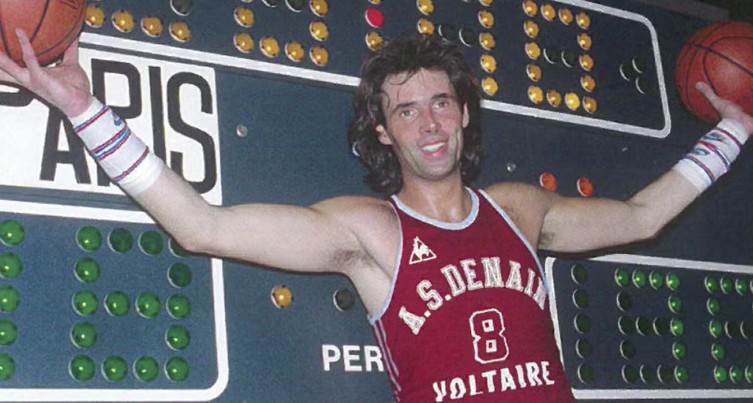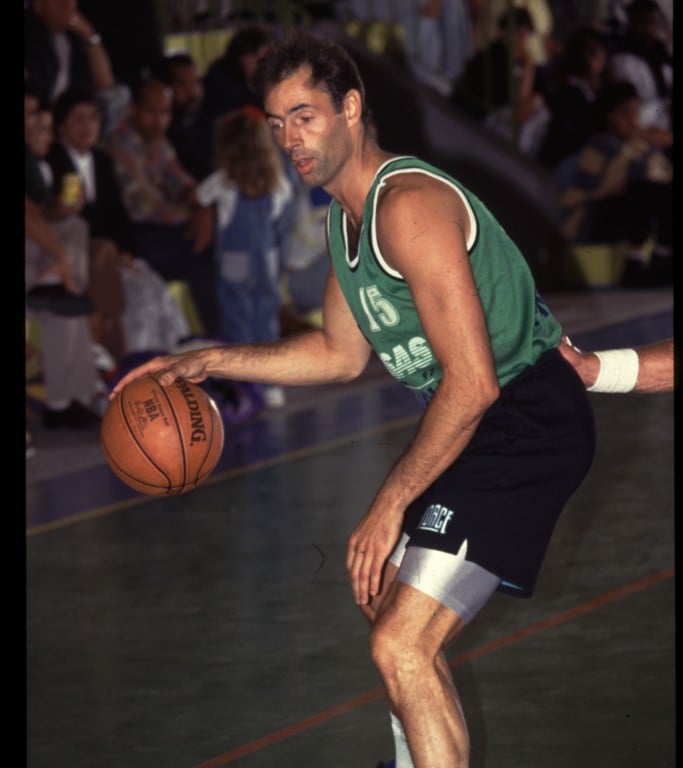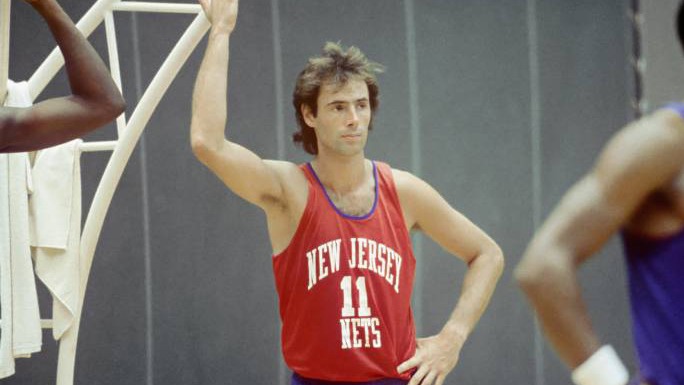
Hervé Dubuisson
"Deadeye Dub”
RETROPLAYERS
Antreas Tsemperlidis
6/19/20256 min read
To the persistent questions from relatives about the progress of his recovery, doctors responded with cryptic and carefully worded answers. Under no circumstances did they want to raise false hopes for the injured man who lay in the ICU room of Saint-Julien Hospital in Nancy. The multiple injuries sustained by the victim of a hit-and-run motorcyclist—who left him bleeding in the street—had placed the medical team on high alert. Following a long operation, the patient was sedated. In the months that followed, he would fall into a deep coma due to traumatic brain injury, face pneumonia, meningitis, and other hospital-acquired infections, but ultimately, he would emerge victorious from this great battle. The road to recovery was long and painful, and he often behaved in inexplicable ways.
Like the time he was at the rehabilitation center in Antibes and suddenly put on the French national team jersey, asking the nurses to take him to the court for a game that only existed in his mind. And of course, he couldn’t miss it—he was the all-time top scorer in their history. The doctors were clear: basketball was what would help him find himself again and return to a normal life. For someone who had spent nearly his entire life on the court and was still actively playing for Montpellier at age 42, just two years before the accident on May 10, 2001, reconnecting with the sport he loved did, indeed, bring about the desired outcome.
A true legend of French basketball, Hervé Dubuisson managed to stand on his feet again and made all of basketball-loving Europe smile for one of its most beloved sons.
The era in which he shined on the court was the era of great scorers, and every self-respecting country had one of its own. For France, that was the famous "Dub"—a cold-blooded scorer on par with his peer (born August 8, 1957) Nikos Galis. He showcased his talent early, debuting at age 15 with Denain. His call-up to the national team for the European Youth Championship in Italy was expected, as was his top-scoring performance. Two years later, though courted by all major French clubs, he chose Le Mans—a decision justified by the two championships (1978, 1979) he won, the only titles in his career that bore his signature.
Those were also the first years he began a streak as the top French scorer in the league, though never the overall top scorer due to the dominance of American imports like Ed Murphy of Limoges (note: the French league had a flawed scoring system that awarded the top scorer title based on highest average points per game, with a minimum number of games, rather than total points scored). In the national team, though initially low in the informal hierarchy—veterans like Gillet and Beugnot took priority—he found his role and, from EuroBasket 1977 onward, was considered a mainstay. The "Tricolore" jersey with the number 11 found its permanent wearer for the next twelve years and nine major tournaments. In one of them, the 1979 EuroBasket in Turin, he would first face the team that would haunt him throughout the 1980s: Greece.
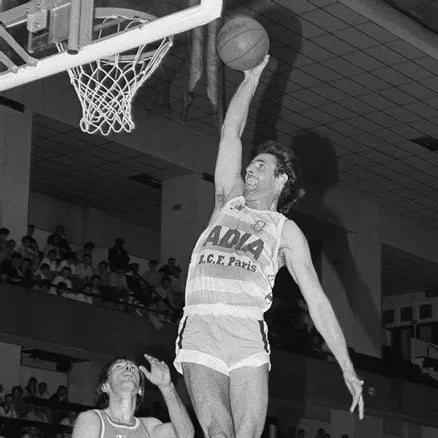

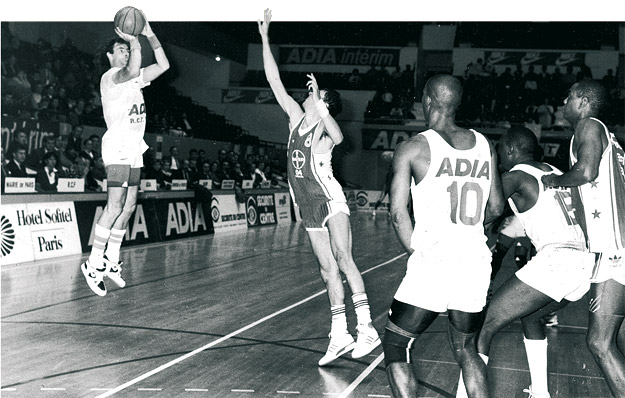

That night, the French won thanks to a full-court buzzer-beater by Senegalese teammate, but their dominance over Greece would be short-lived—ending with the arrival of “The Gangster” (Nikos Galis) from the U.S. That didn’t trouble Dubuisson, who tried on a new jersey in the French league—this time for Antibes. On the Côte d'Azur, his duels with the great Bob Morse became daily occurrences, often forcing Yugoslav coach Đorđe Andrijašević to play peacemaker. After two seasons, “Dub” requested a transfer, and the club obliged—sending him to a team that no longer exists in French basketball: Stade Français, France’s first ever champion. With fellow national team players like Demori and Cham, Dubuisson perhaps played the best basketball of his career in Paris. He was in his prime, and confirmation came from the mecca of the sport.
In 1984, he was named league MVP and joined the national team for the Los Angeles Olympics. After a disappointing team performance, he did not return to France with the squad. Instead, he traveled to New Jersey to join the Nets’ Summer League. L'Équipe featured him on its cover wearing the team jersey, under the headline "The American Dream". Unfortunately, his stint as the first French player in the NBA remained just that—a dream.
His one-dimensional playing style and lackluster defense discouraged GM Lou Schaffel from offering him a contract. On top of that, Stade Français refused to let him go without hefty compensation. Threatening FIBA complaints against both the Nets and Dubuisson, the French club effectively ended the NBA dream. He returned to Paris with only the No. 23 jersey and the honorary title of “pioneer” who paved the way for future French players. Though disappointed, Hervé refocused on new goals.
First up was EuroBasket 1985 in Germany, where he again led France in scoring, followed by the 1986 World Championship qualifiers in Spain. France was grouped with Poland, Bulgaria, and Greece, with the top two advancing. Greece's two losses to Poland turned the group upside down, and fate decided that everything would be settled in a seaside village in Normandy near Cherbourg. On November 21, 1985, in Équeurdreville-Hainneville, 3,500 fans packed a small gym, hoping to shout “Vive la France” at the end. The winner would all but qualify for Spain, the loser left hoping for miracles. The game turned into a Hitchcock-like thriller. The teams' top scorers—Dubuisson and Galis—went head to head in a scoring duel. The Frenchman won the battle (51–43), but Galis and Greece won the war in a triple-overtime epic. Giannakis tied it with a three-pointer at the buzzer of regulation; Andritsos followed with a two in the first OT; Dubuisson returned the favor with a buzzer-beating three in the second. But in the third and final overtime, Galis and Fasoulas sealed a 130–126 Greek victory, sending France packing and Greece to its first ever World Championship.
That night also produced one of Greek basketball’s most legendary anecdotes. Absent due to his college commitment to NC State, Panagiotis Fasoulas called the hotel to speak with Nikos Filippou.
“Hey Niko, what was the score?”
“We won, 130–126.”
“You idiot, I meant our score, not Lakers-Celtics!”
In the end, France still made it to the 1986 World Cup thanks to a FIBA wildcard, but as usual, their matches with Greece were nail-biters. Greece again came out on top and moved to the next round, while France went home. The next clash was in Athens, 1987, at EuroBasket. Dubuisson, still scoring relentlessly with Racing Paris, was called up by Jean Galle. On June 6, Greece and France faced off again—winner takes all. Galle benched “Dub” early, opting for Beugnot, but eventually called him in, needing quick points. Dubuisson delivered with long-range threes. Still, it wasn’t enough. Greece won and moved on to glory, while France was relegated to the 9th–12th place bracket. Déjà vu in 1989 in Zagreb, in Dubuisson’s last tournament with France. Same situation. Same rival. Same result.
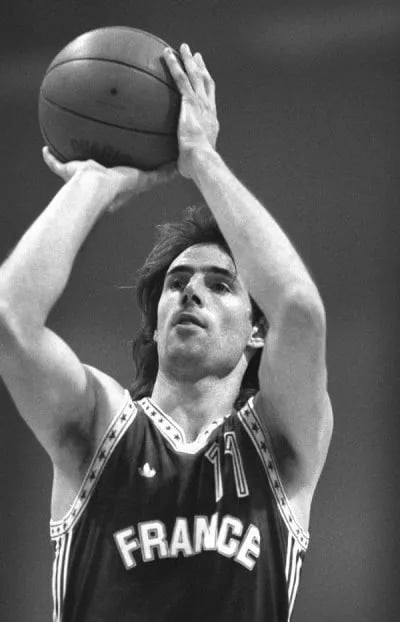

With 254 caps and 3,821 points, he still holds the records for the French national team. At age 32, he dedicated himself to club basketball, adding more points to his name. Between 1993 and 1999, he played for four teams and even coached. His final stop: Montpellier, where he retired after 25 years and 12,557 points. His ambitious coaching career was cut short by the accident described earlier. The team he helped build—Nancy—won the last Korac Cup in 2002, dedicating it to “Dub” and honouring his contribution. Perhaps this offered him a bit of redemption. Despite his brilliance as a scorer, he was often unlucky. Most of his clubs—except Le Mans—weren’t top-tier, and he played during the era dominated by Limoges and Pau-Orthez. In the national team, France had perhaps its best pre-Parker generation, but always fell short at critical moments. Thus, many of Dubuisson’s outstanding performances went to waste. But basketball lovers always remember this bohemian Frenchman with the angelic face, the finesse in his play, and his “killer” shot.
A true “deadeye,” Dubuisson didn’t forgive even the slightest lapse in defense, executing with flawless style in the blink of an eye. Rightfully, he is considered one of the greatest shooters in European basketball history—a true legend for his country.
